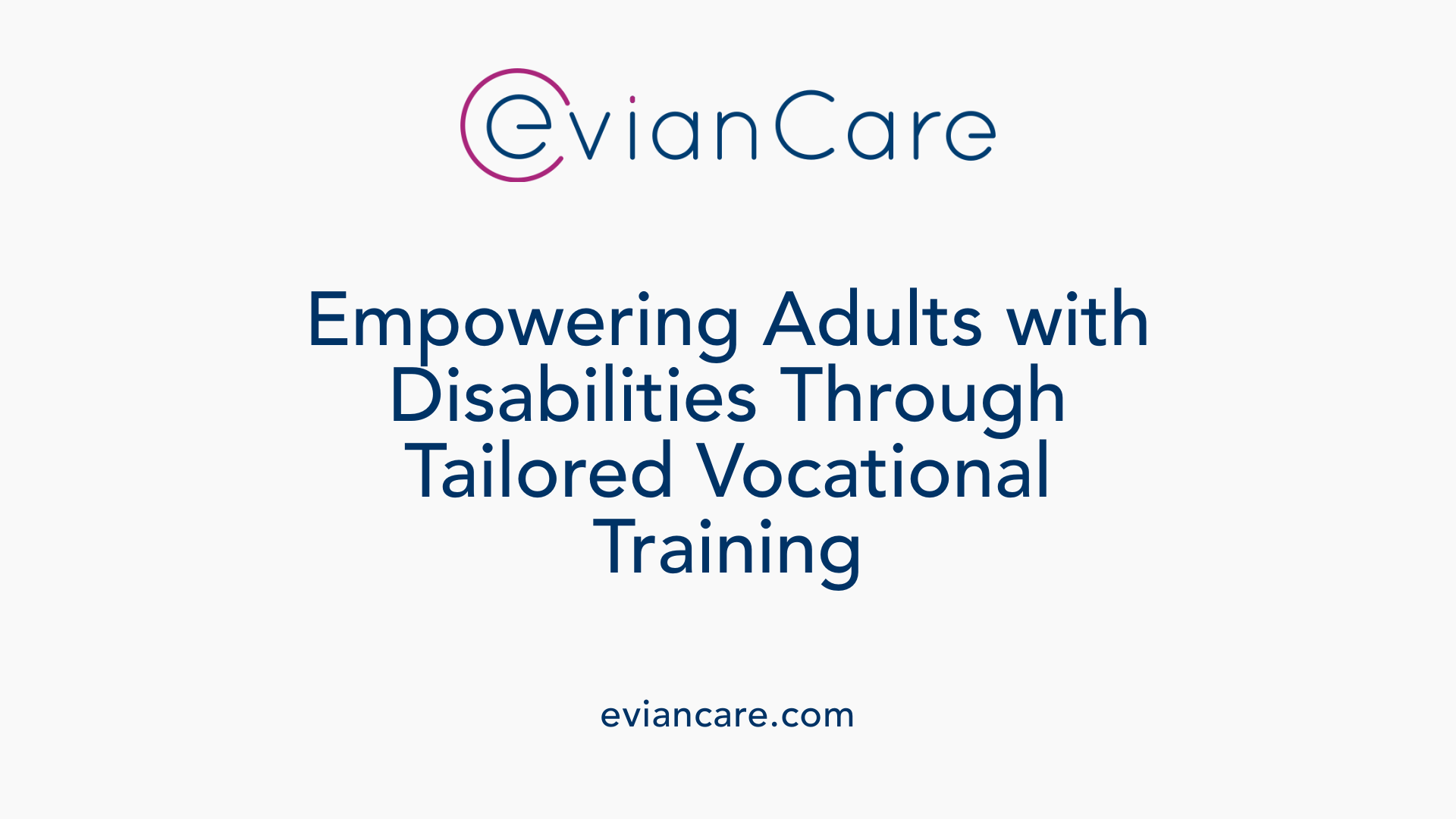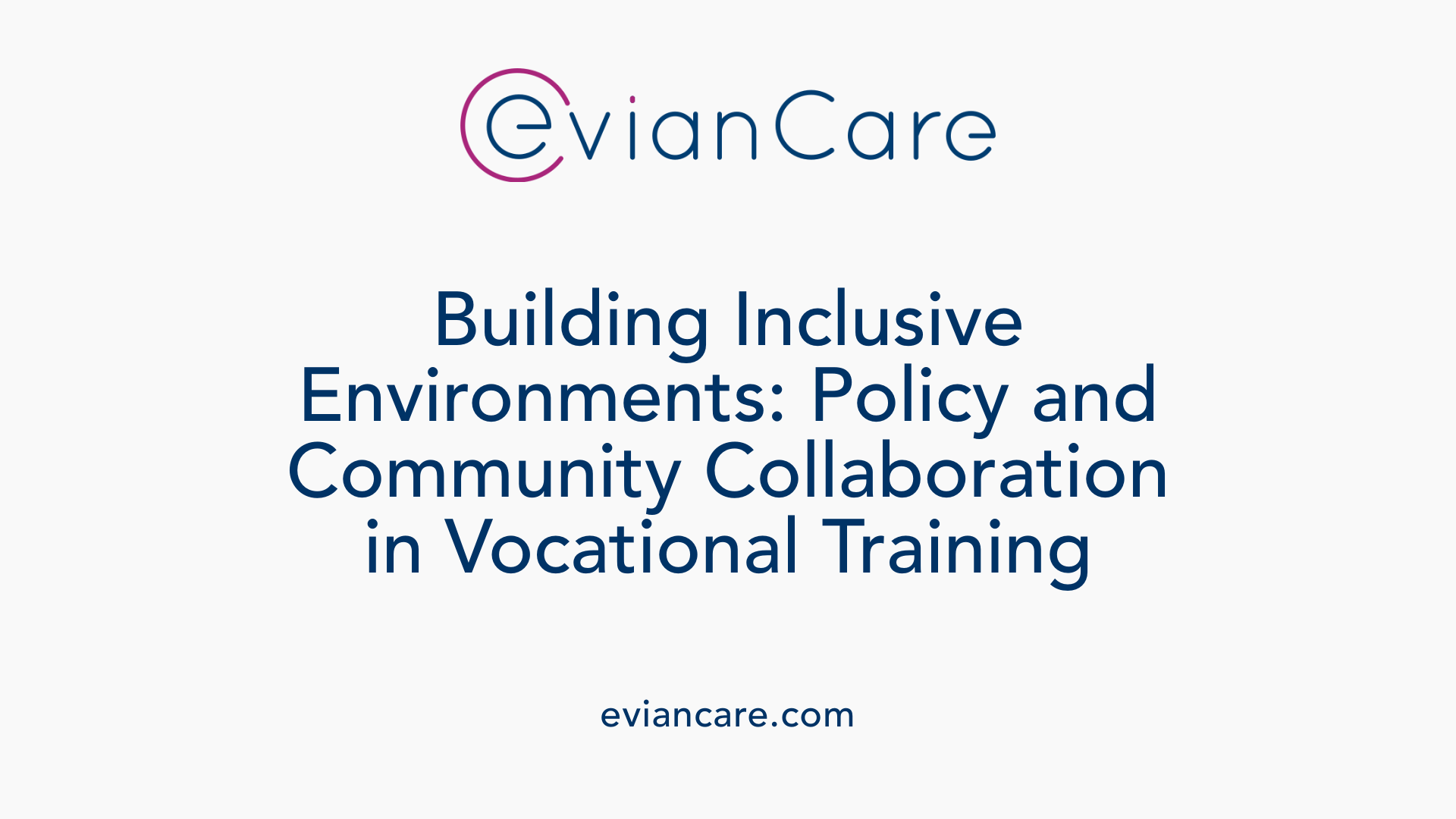
Opening Doors to Employment and Independence
In recent years, there's been a growing recognition of the importance of inclusive vocational training for adults with disabilities. These programs play a crucial role in equipping individuals with the skills, confidence, and support necessary to achieve meaningful employment, social integration, and personal independence. This article explores various training pathways, resources, legal rights, and innovative initiatives designed to foster inclusivity and empower adults facing diverse challenges in their career journeys.
Understanding Vocational Training for Adults with Disabilities

What is vocational training for adults with disabilities?
Vocational training for adults with disabilities, especially those with intellectual disabilities, is designed to develop essential job skills tailored to their individual abilities and needs. These programs often include skill-building workshops, supported employment services, and on-the-job mentorship to facilitate successful integration into the workforce.
Beyond vocational skills, these programs emphasize social skills, independence, and everyday life skills such as money management, self-care, and community navigation. Adaptive and personalized approaches, such as individualized education plans (IEPs) and the support of trained professionals, are fundamental elements to ensure the effectiveness of these initiatives.
The primary goal of vocational training is to enhance employment prospects, foster independence, and improve overall quality of life for adults with disabilities. Programs like supported employment and pre-employment transition services are common, providing ongoing coaching and assistance to help individuals succeed.
What types of disabilities qualify for vocational rehabilitation?
Disabilities that qualify for vocational rehabilitation include physical impairments such as mobility difficulties, chronic health conditions, and sensory impairments. Mental health challenges like depression, anxiety, bipolar disorder, and PTSD also qualify.
Developmental and intellectual disabilities, including autism spectrum disorder and Down syndrome, are supported through these programs. Learning challenges such as dyslexia, dyscalculia, and dysgraphia, as well as substance use disorders, can also be addressed.
To qualify, individuals typically undergo assessments to confirm that their impairments present substantial barriers to employment. The goal is to support these individuals through services like job training, counseling, workplace modifications, and assistive technology, with services provided free of charge.
What skills are required to work with adults with learning disabilities?
Working with adults with learning disabilities requires a combination of patience, flexibility, and strong communication skills. Professionals must be capable of adapting their communication styles to meet individual needs and demonstrate resilience, as this role can be demanding.
Assertiveness is important to advocate for clients’ rights and prevent discrimination, while sensitivity and understanding foster trust and cooperation. Additionally, skills in organization, observation, problem-solving, and prioritization are essential to provide effective support.
Professionals should also be committed to promoting independence and safeguarding the well-being of individuals, working collaboratively within multidisciplinary teams to create supportive and inclusive environments.
How does vocational training facilitate employment, independence, and social integration for adults with disabilities?
Vocational training plays a vital role in helping adults with disabilities achieve employment, independence, and social integration. By providing customized skill development, these programs prepare individuals for real-world work environments, often including practical activities like culinary arts, crafts, or technology.
Partnerships with local businesses and internships are common, which enhance employability and provide hands-on experience. These opportunities help build confidence, practical skills, and social interactions.
Support services such as accommodations, assistive technologies, ongoing coaching, and mentorship are crucial for ensuring success and job retention. Additionally, inclusive policies and active community engagement reduce barriers, promoting broader societal acceptance of individuals with disabilities.
What resources, initiatives, and legal rights support vocational rehabilitation for adults with disabilities?
Resources include government-funded programs such as Vocational Rehabilitation (VR) services, which offer tailored education, training, and employment support. Laws like the Rehabilitation Act of 1973 and the Workforce Innovation and Opportunity Act (WIOA) are essential in promoting equal employment opportunities and preventing discrimination.
Federal agencies like the Rehabilitation Services Administration (RSA) oversee and fund these services, providing technical assistance and ensuring compliance.
State Rehabilitation Councils and advocacy groups monitor program quality and help individuals navigate their legal rights. Initiatives such as supported employment, assistive technology, and pre-employment transition services further support adults in achieving employment goals.
What are some available training programs and skills development opportunities for adults with disabilities?
A variety of training programs and opportunities are available to support adults with disabilities. The Ticket to Work program offers free employment training and work experience for Social Security beneficiaries.
Organizations like CareerOneStop.org, AbilityOne.gov, and USAJOBS provide online courses, job support, and accommodation guidance.
Specialized programs like Veteran Readiness and Employment (VRE) assist veterans, and nonprofits such as PRIDE Industries offer vocational training, internships, and job placement services.
Policies like the Workforce Innovation and Opportunity Act foster inclusive employment and skill development by promoting community-based services and internships.
What are the benefits of vocational training for adults with disabilities?
The benefits include increased chances of employment, greater independence, and improved self-esteem. These programs equip individuals with practical skills that enhance employability and confidence.
Participation also fosters social inclusion by creating opportunities for interaction and community engagement, reducing feelings of isolation.
Supporting policies and accommodations further promote a barrier-free environment, allowing adults with disabilities to participate fully in society and the economy.
Are there online vocational training programs available for adults with disabilities?
Yes, many online vocational training options are accessible for adults with disabilities. The Ticket to Work program provides free online training opportunities for eligible individuals.
Organizations like AbilityOne and JAN offer online courses, workplace accommodation guidance, and support services.
Pre-employment transition services and other online platforms help young adults prepare for careers, ensuring continued support as they transition into the workforce.
What are some accessible and supported employment services for adults with disabilities?
Supported employment services include job coaching, workplace accommodations, and tailored job placements. Programs like Supported Employment focus on ongoing on-the-job assistance to ensure stability and success.
The Ticket to Work initiative facilitates training and experience without risking benefit loss.
Organizations such as PRIDE Industries and local vocational rehabilitation agencies provide personalized support, benefits counseling, and job search resources.
Advocacy groups and resources like the Job Accommodation Network promote inclusive workplaces and assist in implementing accommodations to help adults with disabilities thrive in employment.
What are some common or easy jobs suitable for adults with disabilities?
Suitable jobs include clerical roles like data entry and administrative assistance, customer service, and positions in hospitality or food services, especially with accommodations.
Creative roles such as graphic design, photography, music, and writing are flexible options, often possible to do remotely.
Remote opportunities like eCommerce, medical transcription, and virtual assistance provide additional accessible employment options.
Flexible and supportive environments enable many adults with disabilities to find fulfilling jobs across various industries.
This overview highlights the importance of robust programs, support services, and inclusive policies to expand employment opportunities for adults with disabilities, fostering independence and societal participation.
Collaborative Efforts and Inclusive Policy Frameworks

How does vocational training facilitate employment, independence, and social integration for adults with disabilities?
Vocational training plays a vital role in helping adults with disabilities achieve employment, independence, and social engagement. These programs are designed to develop tailored skills that prepare participants for real-world work environments. For example, culinary arts, crafts, and technology training involve hands-on activities that mirror industry standards.
Partnerships with local businesses, internships, and work-based learning opportunities are integral to this approach, improving employability and work experience. These collaborations provide practical exposure, boost confidence, and help individuals transition smoothly into the workforce.
Beyond skills development, vocational training promotes social inclusion. Group projects, workshops, and teamwork foster relationships and enhance social skills. Support services—such as workplace accommodations, assistive technology, ongoing coaching, and mentorship—are essential to ensure success and continued employment.
Advocacy, inclusive policies, and multi-sector partnerships drive societal change, removing barriers and fostering an environment that celebrates the talents and contributions of adults with disabilities.
What models of inclusive programming have been effective in vocational training?
Effective inclusive programming spans several models. Mainstream integration allows individuals with disabilities to participate alongside peers without disabilities in standard settings, ensuring accessibility and equal opportunity. Supported employment is another widely used model that offers on-the-job coaching, mentorship, and personalized support tailored to individual needs.
Customized employment creates roles based on a person’s strengths and interests, fostering a sense of purpose and boosting engagement. Community-based programs often involve partnerships with local businesses and nonprofits to create authentic and meaningful work experiences.
These models emphasize collaboration among employers, service providers, and advocacy organizations, focusing on accessibility, flexibility, and real-world relevance. The goal is to increase employment retention and social inclusion by making workplaces more accommodating and supportive.
How do policies and legislation support inclusive vocational training and employment?
Laws and policies such as the UN Convention on the Rights of Persons with Disabilities, the Rehabilitation Act of 1973, and the Workforce Innovation and Opportunity Act (WIOA) create a framework for inclusive employment. They mandate nondiscrimination and require reasonable accommodations in educational and workplace settings.
Funding provisions within these policies support tailored training, supported employment programs, and pre-employment transition services, enabling access for all disabled individuals. Legislation also fosters collaboration between government agencies, educational institutions, and private sector employers.
'Employment First' initiatives further reinforce this by prioritizing competitive integrated employment as the primary goal for individuals with disabilities. Such policies are instrumental in removing systemic barriers, promoting societal inclusion, and ensuring that adults with disabilities have equitable access to employment opportunities.
What role do community partnerships and employer collaborations play in expanding vocational opportunities?
Community partnerships and collaborations with employers are essential for broadening vocational opportunities. These partnerships facilitate the creation of internships, apprenticeships, and supported employment positions that are customized to meet both employer needs and individual capabilities.
By engaging local businesses and nonprofits, programs can implement inclusive hiring practices, provide workplace accommodations, and promote disability awareness. Educating employers about the benefits of a diverse workforce encourages inclusive hiring and retention.
Community outreach efforts, mentorship programs, and networking enable adults with disabilities to build connections that support long-term employment. These collective efforts help change perceptions, promote workplace diversity, and build sustainable, inclusive economic growth.
Successful models emphasize resource sharing, capacity building, and joint initiatives that ensure meaningful, ongoing employment opportunities for all.
| Aspect | Description | Examples | |---|---|---| | Models of Programming | Mainstream integration, supported employment, customized roles | Inclusive classroom settings, on-the-job coaching | Community-based initiatives | Collaboration with local businesses and nonprofits | | Policy Support | Legislation promoting nondiscrimination, accommodations, funding | WIOA, UN Convention, Employment First policies | Funding programs | Supportive financial and technical resources | | Community Partnerships | Employer collaborations, local agencies, nonprofits | Apprenticeships, internships, mentorships | Outreach, awareness campaigns | Disability awareness and inclusive practices |
This comprehensive approach underscores the importance of multi-sector collaboration and supportive policies in creating thriving employment pathways for adults with disabilities.
Empowering Through Inclusion
As the landscape of vocational training continues to evolve, it plays a crucial role in transforming lives by fostering employment, independence, and social integration for adults with disabilities. Through inclusive policies, innovative programs, community partnerships, and dedicated support services, barriers to workforce participation are steadily breaking down. The collective efforts of government entities, non-profit organizations, private sector stakeholders, and advocacy groups are essential in creating a society that values diversity and promotes equal opportunities. Moving forward, expanding access to online training, enhancing supported employment models, and advocating for inclusive policies will remain fundamental to achieving a more equitable and inclusive workforce where every adult with a disability can thrive.
References
- Job training and employment programs for people with disabilities
- DARS Pathways to Careers
- Employment, Training, and Wages for People With Disabilities
- Opportunities, Inc. » Helping Adults with Disabilities within the ...
- Vocational Training for Adults with Intellectual Disabilities
- Vocational rehabilitation |Workers with a Disability - CareerOneStop
- Career Pathways - National Disability Institute
- Employment Services | SOAR365
- Paraquad's Job Training Programs for Teens & Adults with Disabilities












